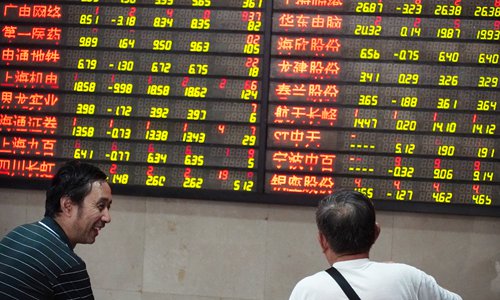HOME >> BUSINESS
Trump tweets can no longer move A shares
By Xie Jun Source:Global Times Published: 2019/8/26 20:41:12
Chinese investors less sensitive to trade spat, experts say

Individual investors follow the stock market at a bourse in Nanjing, East China's Jiangsu Province on Monday. Photo: IC
US President Donald Trump's tariff hike announcements for China, often made on his personal Twitter account, are gradually losing their impact on A shares as the Chinese mainland capital markets have grown increasingly immune to news about the trade spat, while such news often causes quite a storm on US stock markets.This shows that Chinese investors are becoming more confident, as they found that the trade war didn't affect the nation's economy as much as they had anticipated. Investors in the US, on the other hand, have started to feel panicky about the negative impact of the dispute, which they didn't care too much about in the beginning, experts said.
The Shanghai Composite Index fell 1.17 percent on Monday while the Shenzhen Component Index was down 0.98 percent.
The two markets fell following Trump's tweet on Friday (US time) that the US government will raise tariffs on $250 billion of Chinese goods to 30 percent from 25 percent starting on October 1. He also said the US would raise tariffs on $300 billion worth of Chinese products effective from September 1 from 10 percent to 15 percent.
Earlier that day, China announced tariff hikes on $75 billion worth of US products in response to Trump's latest planned tariff hikes.
This wave of tit-for-tat tariffs struck a much heavier blow against the US stock markets than the Chinese markets. On Friday, the Dow Jones Industrial Average slipped 2.37 percent to 25,628.90 points, while the Nasdaq Composite Index slipped 3 percent to 7,751.77 points.
This was in stark contrast with the situation when the trade war began. At that time, news of tariff hikes by the US often set off an instant plunge on the mainland markets.
For example, on June 19, 2018, the Shanghai market slumped 3.78 percent and the Shenzhen market was down 5.31 percent, after Trump announced on the night of June 18 that the US would add 10 percent tariffs on $200 billion of Chinese goods. That was a punitive measure related to a round of tariff increases he just had just announced several days earlier.
"Mainland investors took the trade war effect very seriously... a bit too seriously ... so the Chinese markets responded quickly and strongly to news of the tariff hikes. But gradually, domestic investors found that the trade war didn't hurt the Chinese economy or their lives as much as they had expected, so their confidence was restored," Xi Junyang, an economics professor at the Shanghai University of Finance and Economics, told the Global Times on Monday.
According to Xi, news of tariff increases sent A shares down several times before. "The impact from the trade war moves on A shares is gradually decreasing and will dwindle even more in the future," he said.
A stock investor surnamed Dai told the Global Times on Monday that news of sudden tariff hikes by Trump no longer shocks her as it did previously. She's gotten used to it and started to view those developments as normal trade negotiation proceedings.
Li Daxiao, chief economist at Shenzhen-based Yingda Securities, wrote in his Weibo account on Monday that as overseas capital poured into the Chinese market, mainland capital also slowly woke up. Stronger performances by blue-chip stocks also brought confidence to the market. "After years of adjustment, the resilient nature of the A-share market is becoming more and more evident," he said.
Xi said that US investors, on the contrary, are increasingly sensitive to trade war fluctuations. They have started to feel the negative impact of the trade friction as recent US economic data pointed toward signs of recession.
Yang Zirong, an associate research fellow of the Institute of World Economics and Politics of the Chinese Academy of Social Sciences, told the Global Times that the government has rolled out policies to support the market. For example, there was the China Securities and Regulatory Commission's meeting on Sunday to discuss capital market reforms, which injected confidence into the markets.
Global index providers like MSCI, which are gradually including A shares, also offset external pressures on the market, he said.
Posted in: MARKETS,BIZ FOCUS